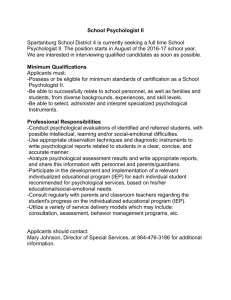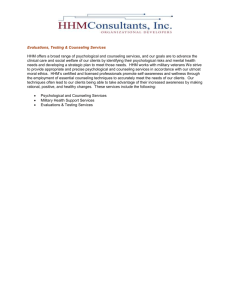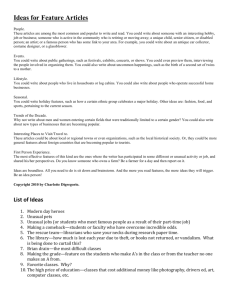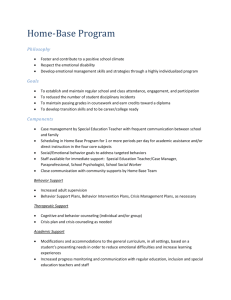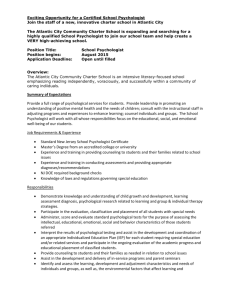BEHAVIORS THAT MAY INDICATE THE PRESENCE OF A
advertisement
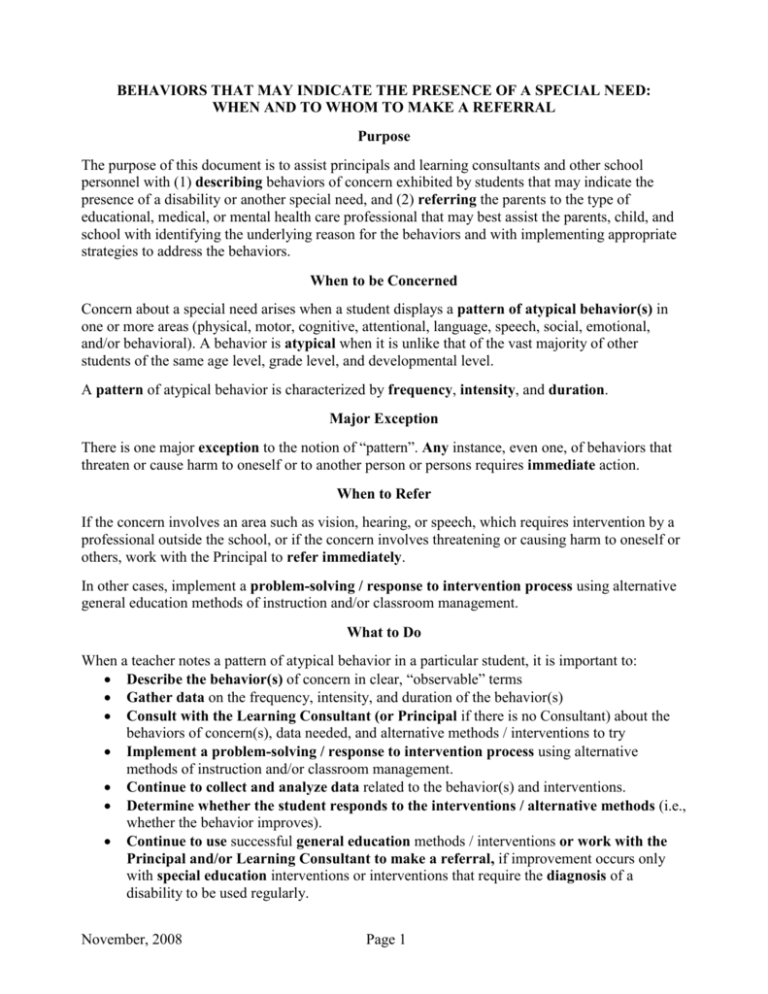
BEHAVIORS THAT MAY INDICATE THE PRESENCE OF A SPECIAL NEED: WHEN AND TO WHOM TO MAKE A REFERRAL Purpose The purpose of this document is to assist principals and learning consultants and other school personnel with (1) describing behaviors of concern exhibited by students that may indicate the presence of a disability or another special need, and (2) referring the parents to the type of educational, medical, or mental health care professional that may best assist the parents, child, and school with identifying the underlying reason for the behaviors and with implementing appropriate strategies to address the behaviors. When to be Concerned Concern about a special need arises when a student displays a pattern of atypical behavior(s) in one or more areas (physical, motor, cognitive, attentional, language, speech, social, emotional, and/or behavioral). A behavior is atypical when it is unlike that of the vast majority of other students of the same age level, grade level, and developmental level. A pattern of atypical behavior is characterized by frequency, intensity, and duration. Major Exception There is one major exception to the notion of “pattern”. Any instance, even one, of behaviors that threaten or cause harm to oneself or to another person or persons requires immediate action. When to Refer If the concern involves an area such as vision, hearing, or speech, which requires intervention by a professional outside the school, or if the concern involves threatening or causing harm to oneself or others, work with the Principal to refer immediately. In other cases, implement a problem-solving / response to intervention process using alternative general education methods of instruction and/or classroom management. What to Do When a teacher notes a pattern of atypical behavior in a particular student, it is important to: Describe the behavior(s) of concern in clear, “observable” terms Gather data on the frequency, intensity, and duration of the behavior(s) Consult with the Learning Consultant (or Principal if there is no Consultant) about the behaviors of concern(s), data needed, and alternative methods / interventions to try Implement a problem-solving / response to intervention process using alternative methods of instruction and/or classroom management. Continue to collect and analyze data related to the behavior(s) and interventions. Determine whether the student responds to the interventions / alternative methods (i.e., whether the behavior improves). Continue to use successful general education methods / interventions or work with the Principal and/or Learning Consultant to make a referral, if improvement occurs only with special education interventions or interventions that require the diagnosis of a disability to be used regularly. November, 2008 Page 1 Professionals and their Specialties If it is advisable to make a referral to an educational, medical, or mental health care professional, it is important to refer to the type of professional most appropriate for the behavior(s) of concern. The following professionals have specific training to address specific types of needs. Educational Evaluations: Public School Evaluation = Referral to the evaluation department of the public school district in which the non-public school is located for the purpose of determining if a child has one or more of the thirteen specific disabilities defined in the Individual With Disabilities Education Act (IDEA) and who because of that disability requires special education and related services. In order for the evaluation to result in a finding of “disabled”, three conditions must be met: (1) the student must meet the diagnostic criteria for one or more of the thirteen disabilities; (2) there must be evidence that the disability has had an “adverse educational impact” on the child’s academic performance; and (3) special education must be the appropriate means for addressing the disability. If the student meets the diagnostic criteria but there is either no evidence of adverse educational impact and/or special education is not the appropriate means for addressing the disability, the public school evaluation will result in a finding of “non-disabled”. School Psychological Examiner = a person certified by the State of Missouri to administer and interpret the results of tests of academic, cognitive, and attentional functioning. Speech-Language Pathologist = An individual who holds a master’s degree or higher in speech and language pathology and has been licensed by the State of Missouri to practice as a speech language pathologist. Speech-language pathologists, sometimes called speech therapists, assess, diagnose, treat, and help to prevent disorders related to speech, language, cognitive-communication, voice, swallowing, and fluency. Speech-language pathologists work with people who cannot produce speech sounds or cannot produce them clearly; those with speech rhythm and fluency problems, such as stuttering; people with voice disorders, such as inappropriate pitch or harsh voice; those with problems understanding and producing language; those who wish to improve their communication skills by modifying an accent; and those with cognitive communication impairments, such as attention, memory, and problem solving disorders. They also work with people who have swallowing difficulties. Medical Evaluations: Pediatrician or Other Physician = An individual who holds a doctoral degree from a medical school, has successfully completed the required postgraduate training, and who has been licensed by the State of Missouri to practice medicine. Physicians diagnose illnesses and prescribe and administer treatment for people suffering from injury or disease. Physicians examine patients, obtain medical histories, and order, perform, and interpret diagnostic tests. Pediatricians care for the health of infants, children, teenagers, and young adults. They specialize in the diagnosis and treatment of a variety of ailments specific to young people and track patients’ growth to adulthood. General practitioners often provide the first point of contact for people seeking health care and often refer them to other physicians with specialties. Occupational Therapist = An individual who holds a master’s degree or higher in occupational therapy and has been licensed by the State of Missouri to practice occupational therapy. Occupational therapy is a specialty that assists persons with developing skills and abilities necessary to perform the tasks of daily living including personal care, performing school tasks, and performing tasks in an employment setting. Occupational therapy focuses on improving gross and fine motor skills, sensory motor processing, November, 2008 Page 2 coordination, adapting to physical environments, organizing and using materials, and developing personal care skills. Psychological Evaluations: Psychologist (Clinical and Counseling) = An individual who holds a doctoral degree in clinical or counseling psychology (Ph.D. or Psy.D.) and has been licensed as a psychologist by the State of Missouri. Psychologists have specialized training in psychological testing and behavioral/emotional assessment. Not all psychologists specialize in testing. For formal evaluations of children where specific recommendations are being sought, a psychologist who utilizes psychological measures as means of evaluation (i.e., IQ and achievement tests, sustained attention measures, behavioral and emotional rating scales) is the best referral. If therapy only is being sought, psychologists provide this service as do other licensed therapists. Therapist = An individual who holds a master’s degree or higher in counseling, another mental health discipline, or social work and has been licensed by the State of Missouri to provide services to the public. This category would include licensed professional counselors (LPCs) and licensed clinical social workers (LCSWs). November, 2008 Page 3 BEHAVIORS THAT MAY INDICATE THE PRESENCE OF A SPECIAL NEED Physical Motor Refer to Pediatrician if: Refer to Pediatrician if: holding objects closer or farther away than normal or in difficulty with throwing, catching, climbing, running, unusual positions squinting or straining to see or read complaining that words or images seem to “jump around” on the page reading less accurately after reading more proficiently for a period of time not responding to sounds from sources that are out of sight not responding to sounds of normal loudness turning head toward sounds he/she wants to hear hopping, skipping, or balancing general lack of coordination general awkwardness or clumsiness and/or frequent falls and collisions difficulty with buttons, shoelaces, zippers, etc difficulty with using scissors, eating utensils, art materials, etc. difficulty with gripping a pencil, pen, or other small objects being overly sleepy, lethargic, and/or lacking in energy difficulty with drawing, tracing, forming letters, etc. difficulty with drawing intersecting lines and/or difficulty repeated rocking, foot tapping, etc walking on one’s toes or other unusual gaits or postures difficulty copying from a model unusually illegible writing, sloppy work, ripped or torn with actions that require crossing the midline of the body work, extensive erasures, etc. Refer to Psychologist if: restless movement, fidgeting, squirming, etc. undersensitivity to sensory input (visual, tactile, auditory, etc.) Social Behavioral Refer to Psychologist or Therapist if: problems interpreting non-verbal cues including body Refer to Psychologist or Therapist if: exhibiting an unusual degree of passivity or language and facial expressions submissiveness not making eye contact with others isolating oneself from peers gravitating toward people outside peer group (i. e., disturbing other students to an unusual degree frequently acting or speaking in an impudent, sassy, and/or disrespectful manner preferring to be with much younger or much older children or with adults) lack of spontaneous sharing of interests, achievements, enjoyment, etc., to an unusual degree lack of emotional reciprocity lack of acceptance by peer group problems making and keeping friends being easily led by peers and/or unusually gullible lack of knowledge of social rules and conventions (e. g., taking turns) problems with playing fair and playing within the rules of a game being unusually uncooperative inappropriate displays of affection or unusual aversion to being touched precocious or inappropriate sexual behavior, verbalization, or involvement November, 2008 using inappropriate language making inappropriate noises teasing, picking on, harassing, and/or bullying other students acting in an explosive and/or unpredictable manner outbursts of temper acting or speaking in a quarrelsome, argumentative, defiant, and/or stubborn manner defying legitimate authority drawing or writing about violent acts, drug/alcohol use, Page 4 etc. possessing/using drugs/alcohol and/or drug paraphernalia vandalizing, destroying, or stealing property making a threat of violence acting in an aggressive, violent, and/or destructive manner toward self, other persons, or animals Cognitive Attentional and/or Behavioral Refer to Public School Evaluation, School Psychological Examiner, or Psychologist if: problems with learning letters, numbers, days, colors, shapes, time, directional and positional terms, and concepts such as before/after, more/less, etc. difficulty with naming letters rapidly difficulty with making sound/letter associations inordinate confusion of symbols transposition of numbers and/or sequences unusual difficulty with abstract thinking difficulty with placing items in appropriate classifications inordinate problems with summarizing and/or with openended questions unusual lack of background knowledge for one’s age learning at an unusually slow pace, especially developing new skills to the automatic level achievement significantly below age mates poor memory, especially cumulative memory problems with ready recall of facts and/or procedures Refer to Psychologist if: unusual difficulty with details inordinate amount of careless errors unusual difficulty with following routines unusual difficulty organizing tasks and/or activities problems with procedures, multi-step tasks, and/or tasks Refer to Psychologist if: being easily distracted daydreaming, “spacing out” often losing track or forgetting in daily activities difficulty sustaining attention in tasks and in play difficulty concentrating and/or focusing excessive instances of not listening not following directions and/or not responding when spoken to directly oversensitivity to sensory input (visual, tactile, auditory, etc.) inordinate delay in beginning tasks or assignments often losing items and/or being without items needed for tasks problems completing tasks avoidance of and/or aversion to tasks requiring sustained requiring sequencing problems making and carrying out plans related to completing projects or unstructured assignments, etc. problems making choices from among options or alternatives inordinate problems with time management Speech and Articulation Refer to Public School Evaluation or to SpeechLanguage Pathologist if: problems with pronunciation of common words speech that is unusually hard to understand getting stuck or hesitating on certain sounds or syllables so that the flow of speech is interrupted speaking with an abnormal pitch, tone, volume, and/or pace unusual voice quality characteristics (raspiness, hoarseness, etc.) November, 2008 Page 5 effort excessive restlessness, fidgeting, and/or squirming inability to remain quiet verbally and/or still physically excessive difficulty remaining seated running, climbing, etc., at inappropriate times being easily excited impulsive responses, acting without thinking difficulty waiting one’s turn excessive talking, talking out, interrupting, beginning to answer before questions are completed shifting from activity to activity without purpose or completion demanding immediate attention difficulty self-monitoring one’s own behavior inappropriately grabbing things from others or removing them from their storage place Oral and Written Language Emotional Refer to Public School Evaluation or to SpeechLanguage Pathologist if: inappropriate use of incomplete sentences in oral language inappropriate grammar or usage for one’s age (e. g., “I seen it, her did it”, etc.) using gestures more than words to express oneself frequent difficulty with finding the right word when speaking difficulty following oral directions and/or comprehending or remembering information communicated orally compared to written and/or visual directions or information frequent requests for information to be repeated inappropriate responses to direct questions (i. e., answer is off topic, unrelated to question) frequent imitation of what other students are doing in order to follow directions identifying similar sounds, discriminating between different sounds, recognizing connections between letters and sounds difficulty naming common objects frequent confusion of basic words slow growth in vocabulary Refer to Public School Evaluation or to SpeechLanguage Pathologist if: inability to decode age-appropriate words by dramatic personality change frequent pouting and/or sulking being overly serious and/or sad frequent expressions of helplessness or hopelessness expressions of being alienated or detached from people dramatic loss of interest in friends, activities, play, etc. frequent negative talk about one’s worth, ability, etc. excessive grouchiness, irritability, or agitation being excessively tense, jumpy, nervous, or easily startled crying often, easily, and/or uncontrollably expressions of feeling out of control inordinate preoccupation with death and dying, violence, etc. any, even one, expression of suicidal thoughts expressing concern about making mistakes, incurring problems with phonological skills such as rhyming, Refer to Psychologist or Therapist if: quick and drastic mood changes or noticeable and recognizing their component parts and/or sounds reading at an unusually slow pace reading words but not understanding their meaning difficulty retelling age-appropriate stories making of consistent reading and spelling errors such as reversals, inversions, transpositions, and substitutions avoidance of and aversion to tasks involving reading and writing criticism or correction, causing disappointment, etc. to an unusual degree expressions of intense, disproportionate guilt overly ruminating on one event (e. g., hurt feelings, embarrassment, painful memories, etc.) being overly fearful (e. g., of losing things, of dirt/germs, of certain places or things, etc.) exhibiting unusual difficulty being apart from parents or other significant adults unusual problems trusting others difficulty adjusting to new environments and/or aversion to trying new activities excessive worrying about things that might happen, including catastrophes, disasters, etc. excessive worrying about what others will think physical symptoms apparently related to worry, fear, and/or stress ignoring the consequences of one’s actions engaging in risky, dangerous, “daredevil”-type behaviors denying responsibility and/or blaming others for one’s actions lying for attention or favors or to avoid consequences easily becoming frustrated or angry reacting out of proportion to the situation unusual aversion to physical contact or unusual craving of affection (CONTINUED) November, 2008 Page 6 being overly preoccupied about one’s body image, cleanliness, etc. expressing delusions and/or hallucinations upsetting repetitive thoughts that cannot be stopped inordinate fixation on or preoccupation with one idea, topic, etc. preoccupations with repetitive behaviors such as Student’s Name: ________________________________________________________________ Time period during which concerns were noted: Teacher’s Name: counting, checking, washing, arranging, collecting, touching, etc. involuntary movements (blinking, twitching, tapping, facial contortions, shaking, biting, picking, etc.) involuntary sounds (unintelligible sounds, obscenities, repetitive syllables, snorts, grunts, etc.) ________________ to _______________ ________________________________________________________________ Additional Comments: References: Early Identification of Special Needs, Catholic Education Office Missouri Division of Professional Registration, State of Missouri Occupational Outlook Handbook, Bureau of Labor Statistics Prepared by: Karen L. Tichy, Ed.D., Catholic Education Office, Archdiocese of Saint Louis Catherine B. Hasler, Ph.D., Counseling and Assessment for Behavioral Health, Inc. Richard Hasler, M.A., Counseling and Assessment for Behavioral Health, Inc. November, 2008 Page 7 Types of Insurance Plans PPO (Preferred Provider Organization) Preferred Provider Organizations (PPOs) allow patients to choose their health care providers. PPO plans contract with health care providers who will charge reduced fee rates in exchange for the plan encouraging plan members to use them by paying a greater portion of the cost of the health care if an “in-network” provider is used rather than an “out-of-network” provider. PPO plan members may also obtain care from an out-of-network health care provider. However, the PPO will typically pay a smaller portion of the cost of services. HMO (Health Maintenance Organization) Health Maintenance Organizations (HMOs) require patients to use “in-network” providers in order for insurance to pay any part of the cost of their services. Questions to Ask About Insurance Plans What coverage does my plan provide for mental health, counseling, and/or psychological testing services? Do I have both “in-network” and “out-of-network” benefits for mental health, counseling and/or psychological testing services? Is there a cap on what the plan will pay per hour on mental health, counseling, or psychological testing services? Are there certain types of psychological tests that will/won’t be approved? Do I have a deductible? What is my percentage of responsibility after my deductible has been met? Do I need pre-approval in order to meet with the provider of my choice? After an initial meeting with the provider do I need approval before continuing with therapy or testing services? If approval is needed for continued services, how frequently will approval be needed and what is the “turn around time” for obtaining approval? Will anyone other than my health care provider have access to specific information about the reasons I am seeking mental health, counseling, or psychological testing services? If so, what specific types of information will be disclosed? [Excerpted by Karen L. Tichy, Ed.D., from information prepared by Catherine B. Hasler, Ph.D., Counseling and Assessment for Behavioral Health, Inc., www.cabh.org, with permission, April, 2008] Distributed by www.ncpd.org This resource may be reprinted provided you credit the authors and the National Catholic Partnership on Disability. November, 2008 Page 8
